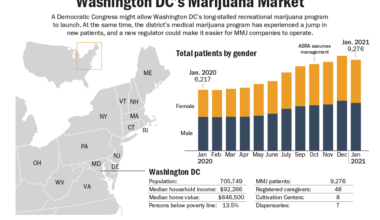As federal marijuana banking reform continues to stall in Congress, a Pennsylvania Senate committee on Wednesday approved a bipartisan bill to safeguard banks and insurers against being penalized by state regulators for working with state-legal medical marijuana businesses.
The Senate Banking & Insurance Committee unanimously approved the legislation, which is sponsored by the panel’s chair and minority chair, Sens. John DiSanto (R) and Sharif Street (D).
At the hearing, DiSanto recognized that while there’s federal guidance in place for banks and insurers that choose to work with state-legal cannabis businesses, they are not “immunized” by federal law because it remains a federally controlled substance—a situation that has made many financial institutions reluctant to take on clients in the industry.
This has “curtailed access to conventional banking and insurance services that are essential for operating any business,” he said. “Safely banking the state-legal cannabis industry removes a public safety risk and is an opportunity to grow our economy and should ultimately lower costs for medical patients.”
The move to provide state-level protections could add pressure on congressional lawmakers to enact a federal change, such as the bipartisan Secure and Fair Enforcement (SAFE) Banking Act that has passed the House in some form six times at this point, only to stall in the Senate.
—
Marijuana Moment is already tracking more than 1,000 cannabis, psychedelics and drug policy bills in state legislatures and Congress this year. Patreon supporters pledging at least $25/month get access to our interactive maps, charts and hearing calendar so they don’t miss any developments.![]()
Learn more about our marijuana bill tracker and become a supporter on Patreon to get access.
—
The text of the Pennsylvania legislation states that a “financial institution authorized to engage in business in this Commonwealth may provide financial services to or for the benefit of a legitimate cannabis-related business and the business associates of a legitimate cannabis-related business.” The same protections would also be codified for insurers.
However, it specifies that the bill would not require banks or insurers to provide services to medical marijuana businesses.
“This is an issue of public safety. Allowing responsible banking quite frankly means that there will be ways of transmitting money that are less dangerous,” Street, who is also the sponsor of a bipartisan bill that he introduced last year to legalize marijuana for adult use in the state, said.
“Walking around with bags of cash is something that we need to move away from, and both the state and federal government need to take the appropriate provisions to prevent that,” he said. “It is an access issue. Allowing banking improves the quality of access that patients will have, and ultimately, again, we in the commonwealth have an obligation—as does the federal government—to take the appropriate steps to allow this.”
The senators previously circulated a co-sponsorship memo to colleagues ahead of the bill’s introduction that raised similar points.
The text of the bill says that state government agencies cannot “prohibit, penalize or otherwise discourage a financial institution or insurer from providing financial or insurance services to a legitimate cannabis-related business or the business associates of a legitimate cannabis-related business.”
It also says agencies cannot “recommend, incentivize or encourage a financial institution or insurer” to not provide services just because a business is associated with marijuana.
Further, state agencies could “not take adverse or corrective supervisory action on a loan made to a legitimate cannabis-related business,” the text says.
Prior to passing the marijuana banking bill, the panel adopted an amendment that the chairman described as technical in nature, saying it “recognizes legitimate cannabis-related businesses authorized through federal law such as the [Drug Enforcement Administration] grower applications for research and requires disclosures for the suspension or revocation of federal permits. It also clarifies financial institution and insurer requirements to obtain legal protections.”
This is another example of how states are taking proactive steps to shield financial institutions and support their cannabis markets, while at the same time pressuring Congress to act.
For example, Washington State officials on Tuesday held a virtual roundtable to address the recent spate of deadly robberies targeting marijuana retailers, with regulators reiterating their call for a federal policy change and discussing steps the state can take on its own while Congress fails to act.
Lawmakers, advocates and representatives of cannabis businesses that have been recently robbed took part in the event, which was organized by the state’s Liquor and Cannabis Board (LCB) after at least three people were killed within the span of four recent days at three different Washington cannabis retailers.
“A decade of congressional dithering is enough,” Washington State Treasurer Mike Pellicciotti said, referring to the fact that the House has repeatedly advanced marijuana banking legislation only to be blocked in the Senate under Republican and Democratic control. “We are at a point where Congress needs to pass the SAFE Banking Act.”
Pellicciotti made similar remarks at a recent conference of the National Association of State Treasurers (NAST). And Colorado Treasurer Dave Young echoed that sentiment in a recent interview with Marijuana Moment.
SAFE Banking Act sponsor Rep. Ed Perlmutter (D-CO), for his part, is committed to getting something done before his retirement at the end of this session. He’s even made a point to talk about enacting the reform legislation during committee hearings on ostensibly unrelated or wider-ranging legislation, like at a recent House Rules Committee hearing.
At a recent event hosted by the American Bankers Association (ABA), the congressman said that he will “continue to be a real pest, and persistent in getting this done” before he leaves Congress.
Following the bipartisan House passage of the banking bill, Perlmutter said he naively expected it “to sail through the Senate, which is always a bad assumption, because nothing sails through the Senate.”
But he’s taken pains to build support, including from current Senate leadership that has insisted on enacting comprehensive legalization with firm equity provisions in place before advancing a bill viewed as friendly to the industry.
Despite recently saying that he’s “confident” that the Senate will take up his bill this session, the congressman recognized that while he’s supportive of revisions related to criminal justice reform, taxation, research and other issues, he knows that “as we expand this thing, then we start losing votes, particularly Republican votes and we got enough votes in the Senate to do it” as is.
Perlmutter also brought up the fact that Treasury Secretary Janet Yellen has addressed the federal-state marijuana banking conflict and “she wants to get this off her plate and get it done.”
Ahead of the ABA event, the financial group released a poll that it commissioned showing that a strong majority of Americans support freeing up banks to work with marijuana businesses without facing federal penalties.
Meanwhile, the number of banks that report working with marijuana businesses ticked up again near the end of 2021, according to recently released federal data.
It’s not clear if the increase is related to congressional moves to pass a bipartisan cannabis banking reform bill, but the figures from the Financial Crimes Enforcement Network (FinCEN) signal that financial institutions continue to feel more comfortable servicing businesses in state-legal markets.
Some Republicans are scratching their heads about how Democrats have so far failed to pass the modest banking reform with majorities in both chambers and control of the White House, too. For example, Rep. Rand Paul (R-KY) criticized his Democratic colleagues over the issue in December.
In the interim, federal financial regulator Rodney Hood—a board member and former chairman of the federal National Credit Union Administration (NCUA)—recently said that marijuana legalization is not a question of “if” but “when,” and he’s again offering advice on how to navigate the federal-state conflict that has left many banks reluctant to work with cannabis businesses.
Back in Pennsylvania, a key Senate committee held the last of three scheduled hearings on marijuana legalization earlier this month, taking testimony that’s designed to help inform a forthcoming reform bill that the panel’s chairman is actively drafting.
The Senate Law and Justice Committee meeting involved testimony from cannabis reform advocates, former regulators from other states and industry stakeholders.
Sen. Mike Regan (R), who chairs the panel, circulated a cosponsorship memo last year along with Rep. Amen Brown (D) to build support for the reform, and these meetings are designed to give lawmakers added context into the best approach to legalization for the state.
At an initial hearing last month, much of the discussion focused on whether creating a regulated market would be sufficient to eliminate illicit sales, how police would be affected and the impact on impaired driving.
The second hearing held late last month centered on varying tax structures and other regulatory approaches that have been created in states like Illinois and California.
While reform bills have been introduced in past sessions and the policy change has the support of Gov. Tom Wolf (D), the committee’s final hearing marked only the third time a legislative panel had debated recreational legalization in the Republican-controlled Pennsylvania General Assembly.
Street and Sen. Dan Laughlin (R), the chief sponsors of the bipartisan legalization bill filed last year, also recently filed a bill that would allow medical marijuana patients to cultivate their own plants for personal use. Street had attempted to get the reform enacted as an amendment to an omnibus bill last summer, but it did not advance.
Pennsylvania lawmakers could also take up more modest marijuana reform proposals like a bill filed late last year to expand the number of medical marijuana cultivators in the state, prioritizing small farms to break up what she characterized as a monopoly or large corporations that’s created supply problems.
Additionally, another pair of state lawmakers—Reps. Jake Wheatley (D) and Dan Frankel (D)—formally unveiled a legalization bill they’re proposing last year.
Philadelphia voters also approved a referendum on marijuana legalization in November that adds a section to the city charter saying that “the citizens of Philadelphia call upon the Pennsylvania General Assembly and the Governor to pass legislation that will decriminalize, regulate, and tax the use, and sale to adults aged 21 years or older, of cannabis for non-medical purposes.”
Wolf, the governor, said last year that marijuana legalization was a priority as he negotiated the annual budget with lawmakers. However, his formal spending request didn’t contain legislative language to actually accomplish the cannabis policy change.
The governor, who signed a medical cannabis expansion bill in June, has repeatedly called for legalization and pressured the Republican-controlled legislature to pursue the reform since coming out in favor of the policy in 2019. Shortly after he did that, a lawmaker filed a separate bill to legalize marijuana through a state-run model.
Meanwhile, Lt. Gov. John Fetterman (D), who is running for U.S. Senate this year, said one of his key goals in his final year in office is to ensure that as many eligible people as possible submit applications to have the courts remove their cannabis records and restore opportunities to things like housing, student financial aid and employment through an expedited petition program.
A survey from Franklin & Marshall College released last year found that 60 percent of Pennsylvania voters back adult-use legalization. That’s the highest level of support for the issue since the firm started polling people about it in 2006.
An attempt to provide protections for Pennsylvania medical marijuana patients from being charged with driving under the influence was derailed in the legislature last year, apparently due to pushback by the state police association.
Federal Marijuana Legalization Bill Amendments Get Committee Review Ahead Of Floor Vote
Medical Disclaimer:
The information provided in these blog posts is intended for general informational and educational purposes only. It is not a substitute for professional medical advice, diagnosis, or treatment. Always seek the advice of your physician or other qualified healthcare provider with any questions you may have regarding a medical condition. The use of any information provided in these blog posts is solely at your own risk. The authors and the website do not recommend or endorse any specific products, treatments, or procedures mentioned. Reliance on any information in these blog posts is solely at your own discretion.






